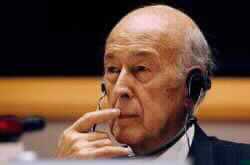HIGHLIGHTS: 'Turkey, Not a European Country & its Entry Would be the End of EU,' d'Estaing|| Comments Heighten Controversy over EU Eventual Border after Enlargement|| d'Estaing Underlines Turkey's Different Culture (Islam) & Different Approach (Birthrate)|| Turkish Official Brands d'Estaing "a Christian Fundamentalist Who Views EU as a 'Christian Club.'"|| Erdogan Plays down Comment as "Nothing More than Emotion"|| d'Estaing Evades Press Conference Pleading Previous Engagement in France|| To Prove His True Credentials, EU Wants Erdogan to Stamp out 'Torture', Free Political Prisoners and Bring 'Torturers' to Justice|| STORY: The elder statesman drafting a constitution for the EU sparked a furor on Friday by saying Turkey was not a European country and its entry would be "the end of the European Union."
Former French President Valery Giscard d'Estaing, 76, head of the Convention on the Future of Europe, told the newspaper Le Monde that those who backed Ankara's candidacy were "the adversaries of the European Union."
His outspoken comments caused uproar and embarrassment in Brussels and outraged Turkish representatives in the Convention. One European Parliament member, Swedish Socialist Jan Andersson, called for his resignation.
The European Commission was quick to distance itself from the comments, which heightened controversy within the 15-nation bloc over the EU's eventual borders once it concludes accession talks with 10 mainly east European candidates next month.
Alluding to Turkey's Muslim population and high birthrate, Giscard said the country had "a different culture, a different approach, a different way of life" and its demographic dynamism would potentially make it the biggest EU member state.
"Its capital is not in Europe, 95 percent of its population live outside Europe, it is not a European country," he said.
Admitting Turkey, an official candidate since 1999, would go "outside the continent" and prompt demands to admit other Middle Eastern and North African states, starting with Morocco.
Asked what the effect would be, he said: "In my opinion, it would be the end of the European Union."
"CHRISTIAN FUNDAMENTALIST"
Giscard reflected in blunt language what many EU politicians whisper privately, but his statement came at a particularly delicate time when Brussels needs Turkey's cooperation to solve several problems related to enlargement.
It is seeking Ankara's support for a U.N.-brokered effort to reunite Cyprus before the island joins the bloc in 2004, and it needs Turkish assent to arrangements assuring Europe's rapid reaction force of access to NATO military planning and assets.
Ali Tekin, Turkish parliamentary representative in the 105-member Convention, branded Giscard "a Christian fundamentalist. He thinks the EU is a Christian club."
But the head of the party set to form Turkey's next government, Recep Tayyip Erdogan, played down the comments as "nothing more than emotion."
A European Commission spokesman said Giscard was entitled to express his private opinion but the EU executive saw no reason to call into question Turkey's candidacy.
Giscard stayed away from a scheduled news conference at the end of Friday's Convention session, pleading a prior engagement in France and leaving vice-president Jean-Luc Dehaene, a former Belgian prime minister, to field questions.
"I am certain the president has expressed his personal view there," Dehaene said. "It is not up to the Convention to say which countries should open or conclude negotiations."
Ankara is pressing for a date to begin accession talks when EU leaders hold a summit in Copenhagen next month to wrap up the next phase of enlargement.
Brussels has so far refused to open negotiations because Turkey's human rights record did not meet EU criteria.
Commission spokesman Jean-Christophe Filori said EU leaders had set a strategy for Turkey's candidacy in 1999 and "as long as this same strategy isn't called into question by the heads of state and government, it remains in force."
That strategy had already succeeded in spurring democratic and human rights reforms, he said, citing laws passed in August abolishing the death penalty in peacetime and authorizing private broadcasting and education in the Kurdish language.
Enlargement Commissioner Guenter Verheugen said this week that if Erdogan's Justice and Development Party wanted to show it was serious about speeding up Turkey's EU bid, it should start by stamping out torture, freeing all political prisoners and bringing torturers to justice.
PHOTO CAPTION
President of the European Convention, Valery Giscard d'Estaing listens to statements during a session of the European Convention at the EU Parliament in Brussels on Thursday Nov. 7, 2002. (AP Photo/Geert Vanden Wijn
- Author:
& News Agencies - Section:
WORLD HEADLINES


 Home
Home Discover Islam
Discover Islam Quran Recitations
Quran Recitations Lectures
Lectures
 Fatwa
Fatwa Articles
Articles Fiqh
Fiqh E-Books
E-Books Boys & Girls
Boys & Girls  Women
Women










